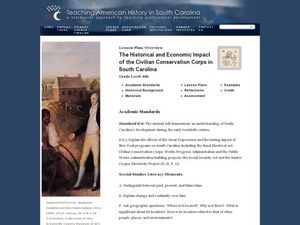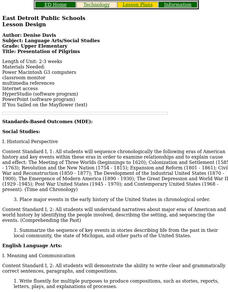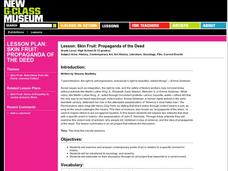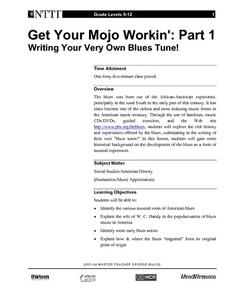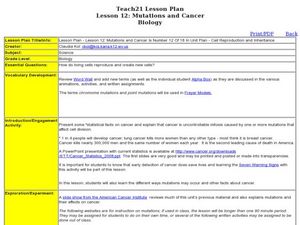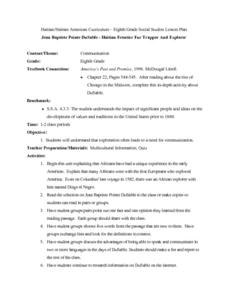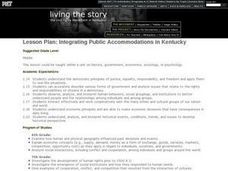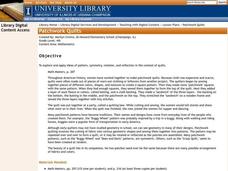Curated OER
The Historical and Economic Impact of the Civilian Conservation Corps in South Carolina
Eighth graders explore the effects of the Civilian Conservation Corps. In this lesson, 8th graders use primary sources to examine how the CCC impacted North Carolina. Students will locate National Parks on a map, write a summary and...
American Museum of Natural History
What Do You Know About Horses?
A 10-question online quiz tests scholars' knowledge about horses: all answers come with an informative explanation.
Curated OER
Robert Fulton and the Steamboat, "Trail of Tears"
Second graders study Fulton and his Steamboat, the "Trail of Tears," the Oregon Trail, the Transcontinental Railroad and the Pony Express in this series of lessons.
Curated OER
Presentation of Pilgrims
Students are given a category to research (clothes, life before the New World, the voyage, etc.) about Pilgrim life. s Students, in groups, create presentations using software program such as PowerPoint.
Curated OER
What Was Columbus Thinking?
Why is Christopher Columbus one of the most studied figures in history? Upper graders will investigate why Christopher Columbus traveled to the New World and what happened to the native people he encountered. They read and discuss...
Missouri Department of Elementary
Equine Science
Did you know that horses have two sets of teeth? There is much to learn about horses, of course, and those interested in equine science will learn much from a 10-lesson agricultural science course that covers not only equine dental...
Curated OER
Businesses and Communities on the Move
In this American transportation history worksheet, students read about various forms of transportation and respond to 16 multiple choice and short answer questions regarding trains, streetcars, automobiles, and trucks.
Japan Society
Popular Culture and Japan’s Gross National Cool
From Manga to Godzilla and Pokemon, Japanese pop culture has been taking the globe by storm. This phenomenon is called "soft power." Learners will examine the differences between hard and soft power, as well as learn the historical...
Curated OER
Lesson: Skin Fruit: Propaganda of the Deed
Art can express acts of injustice and move society to action. Upper graders analyze contemporary art relating to specific moments in history. They discuss propaganda, anarchy, sociology, and violence as activism. After researching and...
Museum of Tolerance
Disenfranchised People of the New Nation
Why are some immigrant groups in the United States embraced while others become disenfranchised? To answer this question, teams investigate why groups emigrated to the US, why some of these these peoples were...
Henry Ford Museum
Physics, Technology and Engineering in Automobile Racing
Start your engines! This five-lesson unit introduces physics and Newton's laws through automobile racing. Each lesson includes background information, a student worksheet, and an answer key. There are also culminating...
Curated OER
Get Your Mojo Workin': Part 1 Writing Your Very Own Blues Tune!
Upper graders listen to the blues. They discuss blues scale, read a description of the blues, and work together to write an original piece. A lesson plan like this ties into American history and African-American musical contributions...
Curated OER
Noncombatancy and the Seventh day Adventist Church
Upper graders investigate how the Seventh Day Adventists are objectors to the practice of war. The lesson covers the Civil War and examines the church's position about the practice of war. The research extends to modern wars and learners...
San Francisco Symphony
By the Great Horn Spoon!
By The Great Horn Spoon is a fantastic novel for introducing learners to life during the California Gold Rush. First, kids research and analyze American folk songs, then they connect to the text as they listen to symphonic pieces written...
Curated OER
The Gettysburg Address
Who was Abraham Lincoln, and what is the Gettysburg Address? Sixth graders participate in a seminar where they read and analyze the Gettysburg Address and its importance. The role of Abraham Lincoln during the Civil War is also...
Curated OER
Mutations and Cancer
Students study how cancer cells mutate and affect cell division. In this investigative lesson students view a PowerPoint presentation learn the seven warning signs of cancer.
Boston University
South African Short Stories: Apartheid, Civil Rights, and You
How are short stories from South Africa connected to issues of civil rights in the United States? A unit plan uses South African short stories to discuss issues such as apartheid, colonization, and civil rights. Questions and activities...
Curated OER
Plains Indians
First graders create a KWL chart on Native Americans and listen to a speaker from a local Indian Reservation. As a class, they are read part of a Native American story in which they pick their own Native American name and identify their...
Curated OER
Jean Baptiste Pointe DuSable: Haitian Frontier Fur Trapper and Explorer
Eighth graders investigate the life and contributions of Jean Baptiste Pointe DuSable. They read and discuss an informational handout, define five words from the passage, conduct Internet research, and write a journal entry from the...
Curated OER
Integrating Public Accommodations in Kentucky
Learners watch videos and conduct research on the belief systems and values related to segregation in Kentucky.
Curated OER
"Julie of the Wolves"
Fifth graders research life in Alaska and compare life there to their lives in this lesson. They read "Julie of the Wolves." They research through the novel and other reference books facts about the Alaskan climate and geography. They...
Curated OER
Eastern Woodland Indians
Fifth graders research the Eastern Woodland Indians in this lesson plan. They list the tribes and write a description of the physical environment. They list examples of the types of food, clothing, transportation, home/shelter,...
Curated OER
Patchwork Quilts
Fourth graders examine about traditional quilting patterns, the symmetry in such patterns, and practice creating patterns of their own. They design a quilting pattern, and groups make colorful "patches," of a pattern. They assemble the...
Curated OER
The Color Purple: K-W-H-L Strategy
Learners can chart what they know, what they would like to know, how they plan to learn, and what they have learned from Alice Walker's The Color Purple. Using questions about women's rights, kids study the themes of the novel...


